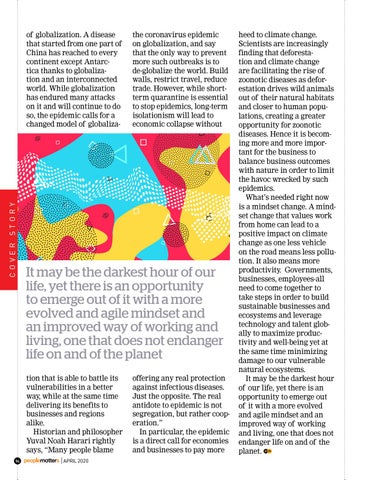the coronavirus epidemic on globalization, and say that the only way to prevent more such outbreaks is to de-globalize the world. Build walls, restrict travel, reduce trade. However, while shortterm quarantine is essential to stop epidemics, long-term isolationism will lead to economic collapse without
C OVER
STORY
of globalization. A disease that started from one part of China has reached to every continent except Antarctica thanks to globalization and an interconnected world. While globalization has endured many attacks on it and will continue to do so, the epidemic calls for a changed model of globaliza-
94
It may be the darkest hour of our life, yet there is an opportunity to emerge out of it with a more evolved and agile mindset and an improved way of working and living, one that does not endanger life on and of the planet tion that is able to battle its vulnerabilities in a better way, while at the same time delivering its benefits to businesses and regions alike. Historian and philosopher Yuval Noah Harari rightly says, “Many people blame | april 2020
offering any real protection against infectious diseases. Just the opposite. The real antidote to epidemic is not segregation, but rather cooperation.� In particular, the epidemic is a direct call for economies and businesses to pay more
heed to climate change. Scientists are increasingly finding that deforestation and climate change are facilitating the rise of zoonotic diseases as deforestation drives wild animals out of their natural habitats and closer to human populations, creating a greater opportunity for zoonotic diseases. Hence it is becoming more and more important for the business to balance business outcomes with nature in order to limit the havoc wrecked by such epidemics. What’s needed right now is a mindset change. A mindset change that values work from home can lead to a positive impact on climate change as one less vehicle on the road means less pollution. It also means more productivity. Governments, businesses, employees-all need to come together to take steps in order to build sustainable businesses and ecosystems and leverage technology and talent globally to maximize productivity and well-being yet at the same time minimizing damage to our vulnerable natural ecosystems. It may be the darkest hour of our life, yet there is an opportunity to emerge out of it with a more evolved and agile mindset and an improved way of working and living, one that does not endanger life on and of the planet.
